- Register
- Log in to Tune-In
- Wishlist (0)
-
Shopping cart
(0)
You have no items in your shopping cart.
Beatles News
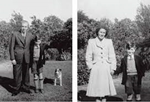
It took John Lennon a while to warm up to George Harrison, but the bandmates became good friends once he did. Lennon wanted to introduce Harrison to his aunt, Mimi Smith, but he knew Smith didn’t tend to like his friends. She wouldn’t let Paul McCartney into her house and once threw a fit in front of Lennon’s girlfriend, Cynthia. Because of this, Lennon worked hard to make Smith think she would like Harrison. Ultimately, though, his efforts were unsuccessful.
Smith took custody of Lennon after calling Social Services on his mother, Julia, twice. After taking him in, Smith made it clear that she had a specific set of expectations for her nephew. She did not want him playing in a band, and she didn’t want him spending time with people she deemed unsuitable. Lennon’s first wife, Cynthia, believed Smith was jealous of Lennon’s friends.
“Mimi wanted and expected John’s devotion, and if you got in her way you were not popular,” Cynthia wrote in her book John. “She constantly hounded and oppressed him. He constantly complained that she never left him alone and found fault with everything he did. Even before his mother died she had been the close details
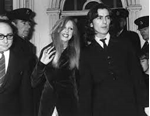
George Harrison was the youngest member of The Beatles. He shot down Paul McCartney’s idea for the hit “Something,” but Macca and John Lennon shot down George plenty of times. He was a burgeoning songwriter, but they kept many of his songs off Beatles albums. His frustrations bubbled to the surface the closer the Fab Four got to the end of the road. Pattie Boyd once said George went into a shell after one Beatles fight, and she couldn’t reach him no matter what she did.
Pattie Boyd (left) and George Harrison leave court after paying a fine for cannabis possession in March 1969.
Paul and John Lennon wrote most of the songs that helped The Beatles climb the charts on both sides of the Atlantic. That hierarchy persisted even as George developed as a songwriter.
The so-called quiet Beatle often had one or two songs per Beatles album as John and Paul pushed for their tunes to make the cut. At that rate, George said he’d have to make a hundred Beatles albums to release the songs he penned during a particularly prolific year.
Source: Jason Rossi/cheatsheet.com
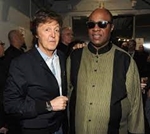
Paul McCartney had an interesting time working with Stevie Wonder on their song, “Ebony and Ivory,’ in 1982. The former Beatle said he had to be “super precise” around the virtuoso because he heard every mistake.
In The Lyrics: 1956 to the Present, Paul said he wrote “Ebony and Ivory” in 1980 “as a response to the problem of racial tension, which had been the cause of a lot of friction in the U.K. around that time.”
Paul made the demo in Scotland in his little studio there. Shortly after, he decided to call Wonder to see if he wanted to do something together. The pair have known each other for a long time. They first met in 1966, after a 15-year-old Wonder played a show in London.
When Paul called the child prodigy about collaborating, they were thinking about writing something together. However, Paul told Wonder he had “Ebony and Ivory.” Wonder agreed to record it.
Paul and Wonder agreed to meet at Monserrat, where producer George Martin had a recording studio. Although, Paul had no idea how long it’d take for Wonder to show up.
Source: Hannah Wigandt/cheatsheet.com

John Lennon and the rest of The Beatles decided to fire Pete Best. John Lennon no longer wanted Pete Best in The Beatles, but admitted they didn’t treat him well when they fired him. Pete Best doesn’t hold a grudge against his former bandmates.
Before Ringo Starr, The Beatles was composed of John Lennon, Paul McCartney, George Harrison, and Pete Best. Best was the band’s first drummer and played with them during their residency in Hamburg, Germany. Ultimately, though, the other three band members felt that Best wasn’t a good fit in the group. They fired him, but Lennon admitted they were cowardly in how they did it.
In 1960, McCartney recruited Best, a local Liverpool drummer, to join The Beatles. He remained with the group for two years and became popular with fans after shows at The Cavern Club.
Source: Emma McKee/cheatsheet.com
details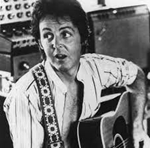
Some of Paul McCartney‘s songs are very personal to him. During an interview, he said one of these personal songs was among the best tracks he ever wrote. Notably, he felt the song was on the same level as “Hey Jude.”
During a 1989 interview with the Los Angeles Times, Paul was asked to name his favorites among his own songs. He named Beatles classics like “Hey Jude” and “The Fool on the Hill” in addition to solo songs like “Maybe I’m Amazed” and “Put It There.”
He named “This One” as one of his favorites, saying this choice was a “surprise.” “It’s another very personal song, which seems to be one factor in common with most of the songs you’ve picked — and it’s sometimes hard to talk about things that are personal,” he said. “That’s why you put them into a song.”
“‘This One’ is about relationships,” he added. “If you love someone, you want to be really great for them.
Source: Matthew Trzcinski/cheatsheet.com

Ringo Starr’s “Photograph” and Ed Sheeran’s “Photograph” became hits in the United States. A magazine predicted Ringo’s “Photograph” would become a No. 1 single. Sheeran’s “Photograph” was inspired by a piano loop another star wrote.
Ringo Starr‘s “Photograph” and Ed Sheeran’s “Photograph” were both hits, but only one reached No. 1 in the United States. Another rock star helped Ringo write “Photograph.” In addition, a rock star helped Sheeran write his song of the same name.According to the 2015 book Ringo: With a Little Help, Ringo and George Harrison co-wrote “Photograph” and George played guitar on the track. To promote it, Ringo shot a music video that was played on the popular BBC show Top of the Pops. The song became critically acclaimed. In addition, Billboard predicted the song would become a No. 1 hit.
Source: Matthew Trzcinski/cheatsheet.com
details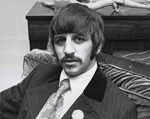
Ringo Starr was angry for years when The Beatles broke up. He dealt with his negative emotions through drugs and alcohol, but they made him feel disconnected from his art. He heard a cruel assessment of his life post-Beatles, but he thought there was some truth to it. Starr said he felt that his life had become sad.
“I was mad,” Starr said, per the New York Daily News. “For 20 years. I had breaks in between of not being.”
He began drinking as a way to deal with the band’s breakup. As a result, his memories from the years after the split are hazy.
“I was drunk,” he said. “I didn’t notice … some of those years are absolutely gone.”
By 1977, Starr was lost. He acted in a number of unsuccessful films, and he stopped playing music he took pride in.
“When I really, really got wrecked, I couldn’t play,” he said, per the book Ringo: With a Little Help by Michael Seth Starr. “For years, I just went downhill. We never made records totally derelict. You got derelict and then you made the records. Occasionally we’d have a … late night, and we’d make music and the next details

The Traveling Wilburys were a supergroup formed in 1988, comprised of some of the most influential musicians of the 20th century. The group was made up of five iconic artists: George Harrison, Bob Dylan, Jeff Lynne, Roy Orbison and Tom Petty. Together, they created three studio albums and numerous singles that have gone on to become some of the most beloved songs in popular music.
This article aims to explore the legacy of the Traveling Wilburys, examining their music, the members involved, their lyrics and messages, and the impact they had on music history. By delving into the past, it will also consider why the Traveling Wilburys remain relevant today.
Source: lihpao.com
details
George Harrison always said he wouldn’t make another album, but he was never serious. He wasn’t fooling himself or his fans.
In 1976, George named his newest album Thirty Three & 1/3 after his age. He told the BBC that he didn’t expect to continue in the music industry for much longer. George said he’d retire at 37.
“I suppose back in the 60s I gave myself to about 36,” he said. “So, still got a couple of years, but I think I’ll probably be around 37 or 38 at the moment that I feel and suppose I could stop. But I don’t know, it’s like George Burns once said that the only thing to retire for, the only reason is to do something better and if you enjoy doing what you’re doing… If I hadn’t been a guitar player, I don’t know what I would’ve done.”
By the following year, George started disliking what he was doing. George felt the music industry sucked all the creativity out of artists. They cranked out music that sounded the same on a conveyor belt. So, George stopped making tunes. He told Rolling Stone that he didn’t write a single song throughout 1977.
Source: Hannah Wigandt/cheatsheet details

The Beach Boys became one of the most popular groups in the early 1960s — topping the music charts alongside the Beatles. Here’s what Brian Wilson said about their first original that reached No. 1, “I Get Around” on Billboard’s Pop chart.
They get around — from town to town. The Beach Boys are the band behind “I Get Around,” a track written by Brian Wilson and Mike Love. The “doo-wop” surf rock track was initially included on the 1964 album All Summer Long and further detailed this group’s affinity for cars.
“I’m gettin’ bugged driving up and down the same old strip,” the first verse states. “I gotta find a new place where the kids are hip / My buddies and me are getting real well known / Yeah, the bad guys know us and they leave us alone.”
Source: Julia Dzurillay/cheatsheet.com
details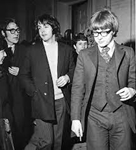
Paul McCartney wrote a song for Peter Asher, and it did so well that it knocked The Beatles‘ “Can’t Buy Me Love” off the charts. Asher got to know Paul well when he started dating his sister, Jane, in the early 1960s. Thanks to Paul and his song, Asher’s career skyrocketed. Paul McCartney and Peter Asher in suits in 1969.
In The Beatles’ early career, their manager, Brian Epstein, arranged for them to move into a London apartment. However, Paul thought it was miserable.
In The Lyrics: 1956 to the Present, Paul wrote that his then-girlfriend Jane Asher and her family must’ve invited him to live in their fancy home in Marylebone after hearing him complain that the apartment “had no soul.” Paul wrote, “This gesture was in the long tradition of giving a garret room to a starving artist.”
Source: Hannah Wigandt/cheatsheet.com
details
Paul McCartney wrote The Beatles’ “Let It Be” when his relationship with John Lennon was strained.
He was also dealing with drug issues around the time he wrote “Let It Be.”
He gets asked if the song bring backs negative memories for him.
Paul McCartney says he wrote The Beatles‘ “Let It Be” during a difficult time in his life. Fans asked him if the song triggers bad memories. In addition, Paul helped create a new version of the song with Boy George and Kate Bush.
In the 1997 book Paul McCartney: Many Years From Now, Paul discussed what he went through when The Beatles made Let It Be. “This was a very difficult period,” he recalled. “John was with Yoko full-time, and our relationship was beginning to crumble: John and I were going through a very tense period. The breakup of The Beatles was looming and I was very nervy.”
Paul’s issues extended beyond his relationship with John. “Personally, it was a very difficult time for me, I think the drugs, the stress, tiredness, and everything had really started to take its toll,” he added. “I somehow managed to miss a lot of the bad effects of all that, but l details
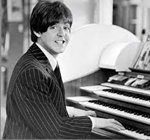
One Paul McCartney song might be about his father and it might be about God. He compared the song to The Beatles’ “Let It Be.”
Paul revealed his feelings about God and the devil.
One of Paul McCartney‘s songs might be about God. It might also be about his father. During an interview, Paul compared the track in question with one of The Beatles’ biggest hits.
In the 2015 book Conversations with Paul McCartney, Paul discussed his song “Motor of Love.” In the song, he sings “Heavenly father, look down from above.” Paul was asked if the line was supposed to be about his father, James McCartney, or God.
“Heavenly father … That’s either my dad, or God, you know?” he said. “When I’m dealing in that area I don’t want to be specific. I’m not really religious.”
Source: Matthew Trzcinski/cheatsheet.com
details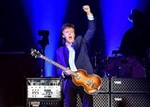
Paul McCartney and Jimi Hendrix were two rock legends born in different parts of the world. The two had tremendous respect for one another, and McCartney recalls witnessing a Hendrix moment that he declared one of the “great honors” of his career.
In 1967, The Beatles released the album Sgt. Pepper’s Lonely Hearts Club Band. The album was tremendously successful, reaching No. 1 on the U.S. Billboard Charts and the official charts in the U.K. Apparently, the album immediately impacted Hendrix as he decided to cover the album’s title track.
The concert took place at the Savile Theatre, and Paul McCartney and George Harrison were in attendance to witness this new guitar god. Hendrix wasn’t aware they were in attendance, but he opened the concert with a performance of the title track just three days after Sgt. Pepper’s release.
In an interview with Stephen Colbert (shared by Far Out), McCartney reflected on the first time he witnessed the guitar wizardry of Hendrix. The former Beatle said he wasn’t expecting the guitarist to open with Sgt. Pepper’s since it had just been released. However, it was the “ultimate compliment” that it had
details
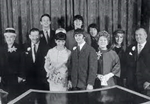
Ringo Starr started a serious relationship around the time he joined The Beatles. The drummer said the sweetest words about his wife soon after they started dating, but the marriage came several years later. Still, Ringo’s wedding in 1965 proved how tight The Beatles’ relationships were before things went sour for the band.
Adding Ringo to the mix near the end of 1962 was a busy time for the fledging Beatles.
From a musical standpoint, adding the talented drummer was the spark they needed to achieve global fame. The Fab Four hit the British charts by the end of the year, released three No. 1 singles and a No. 2 in England in 1963, and conquered North America by early 1964.
Two of the Fab Four’s personal lives were quite busy. Ringo started dating Maureen Cox around the time he joined the band. John Lennon got married a few days after the drummer joined.
Source: Jason Rossi/cheatsheet.com
details